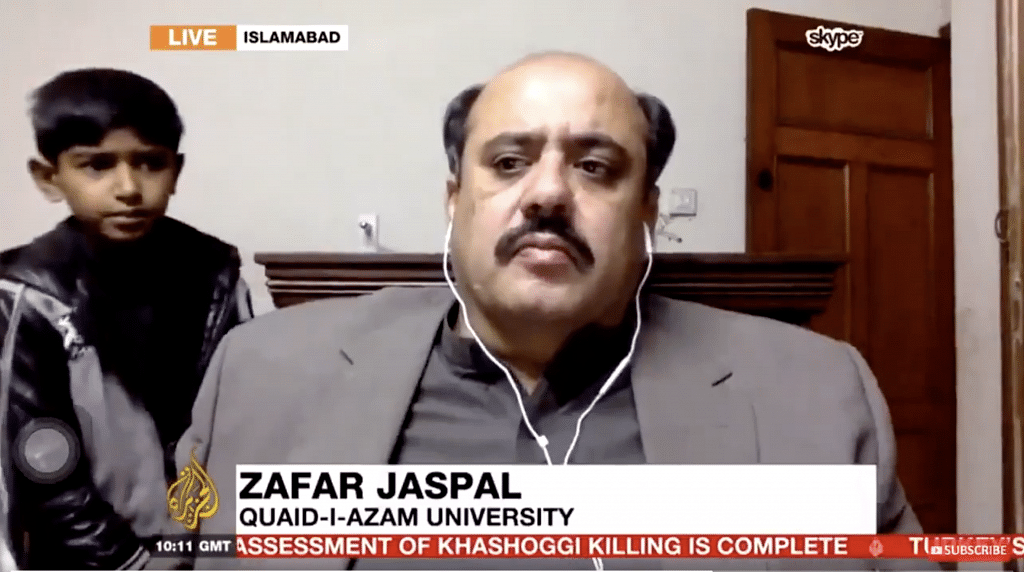The viral video of Pakistani academic Zafar Nawaz Jaspal has launched a thousand jokes and frenzied online speculation.
Until now, the world knew Zafar Nawaz Jaspal as a Pakistani academic and commentator on strategic affairs, counter-terrorism and the China-Pakistan Economic Corridor.
Now, he is the “Al Jazeera dad” or the “Pakistani dad”. And the viral video in Pakistan has launched a thousand jokes and fuelled frenzied online speculation.
On 23 November, a Twitter handle shared a video of a fragment of a TV interview with Jaspal, and declared that Al Jazeera has finally found an answer to last year’s famed ‘BBC dad’ Robert E. Kelly.
This 7-second video showed the no-nonsense professor Jaspal being interviewed live on Al Jazeera English about the terror attack on the Chinese consulate in Karachi. When he notices that his son is hovering in the background, he gestures him to move away. But the little boy misunderstands and comes closer to the camera. Jaspal flinches and sends him away with a stern hand move that South Asians know only too well.
Al Jazeera finally has an answer to BBC dad. @AJEnglish @Robert_E_Kelly pic.twitter.com/m9DUrJSy38
— Fintan Monaghan (@fintanjourno) November 23, 2018
And a viral ‘Pakistani Dad’ is born.
Jaspal is affiliated with the School of Politics and International Relations at Pakistan’s Quaid-i-Azam University.
He has now joined the gif hall of fame with Kelly, another professor who was mortified when the BBC was interviewing him last year and his children gate-crashed. Kelly who teaches at the Pusan National University in South Korea laughed and said: “This is now the first line in my obituary”.
Also read: Picture abhi patriarchy hai: Studying Bollywood’s sexism disease
Pakistanis offered varied speculation on social media.
Nosheen Abbas tweeted: “Hahaha his face read mai chittar lagaoon ga” (I am going to hit you with my slipper if you don’t stop that).
Another said: “That also shows the diff of @BBCWorld & @AlJazeera_World cultures Middle East Dad vs European Dad :)”.
To this, came a sharp reply: “South Asian Dad not Middle Eastern for god’s sake”.
But most chatter was about the work-from-home culture that has engulfed us, and journalists bemoaned the constant pressure from an avaricious media, which is hungry for bytes at odd hours. One can never really switch off as long as there is Skype or Facetime.
Also read: First Indian Taliban came for women drinking in pubs, now they have come for nighties
Pakistani fathers empathised with the hapless Jaspal and some even spoke up about what their partners go through trying to accomplish their tasks for the day with children forever waiting to trip them up. The only difference is that fathers are floundering at multi-tasking and their discomfort is showing – in shareable 7-second time capsules.
Jaspal’s students even offered their commiserations to the unfortunate child in the clip. One called it a ‘retaliation’ by a nuclear scholar, and recalled fondly a time when she was “so scared to attend your class of Nuclear Politics”.
Jaspal’s experience has one more thing in common with Robert Kelly. Some viewers wondered aloud if the boy in Jaspal’s clip was a son or an underage house employee. Jaspal’s silence appears to embolden this suspicion. In a similar fashion, viewers had initially mistakenly assumed that the South Korean wife in Kelly’s video was a nanny.
Some Pakistanis have gone as far as tagging the minister of human rights on social media, calling out Jaspal’s behaviour and fearing for the safety of the little boy. They, however, have been asked to calm down with references to what had transpired with Kelly: “it’s just assumptions, let’s just stick to the light side of video”.
The Pakistani dad is currently going through a moment of crisis. For the longest time, children used to be threatened with the ‘Wait Till He Gets Back from Work’ line.
Now, popular media is rewriting the template of how fatherhood is done – resembling what is happening elsewhere in the region. The smiling domestic goddess who waited upon the family, cooked with the right kind of oil and turned her whites whiter and still looked perfectly groomed is retreating. She now makes space for the stern- (albeit still well-groomed and coiffed) faced woman who has to make do with the husband who is trying his best but is clearly struggling with the choice of washing machine and aata. Fawad Khan does make a good cup of morning tea though.
The recent advertising campaign for Kenwood had the popular Indian actor Nawazuddin Siddiqui playing a Pakistani husband who doesn’t get the social niceties and the changing power structure of the current day household. When he says, “I shut up my wife for good”, he is quickly caught out by his friends. It is no longer kosher.
So, Pakistani men of a younger generation are now looking around expecting to be rewarded and acknowledged for pitching in. Cricketing icon and new dad Shoaib Malik said in an interview that he envies how “a friend of mine had a paid three-month paternity leave and I wish I could do that”.
Also read: Despite wage increase, number of working women in India fell between 1983 & 2011, says study
It remains to be seen whether Jaspal’s predicament makes him the viral star that the other great Pakistani export is – Chand Nawab. We also await whether the exchange in the video brings about a much-needed conversation on how mothers continue to go through debilitating work-life pressures, leaning in and out, and can never afford to take their eyes off the ball. Pakistani mothers have not spoken up about the Jaspal video so far. Perhaps, that is the reason why we don’t have a counter #NotAllPakistaniDads yet.
Aneela Babar is a gender and cultural studies specialist, and the author of ‘We Are All Revolutionaries Here: Militarism, Political Islam and Gender in Pakistan’.
